All I Want for Christmas is Psychiatric Books

HAPPY HOLIDAYS!
I just email blasted my family with a holiday wish list, which no doubt, included a long list of books. Thought I would share. Comment if you found some other good new books out there!
A History of Psychiatry: From the Era of the Asylum to the Age of Prozac
by Edward Shorter
 Publisher Summary: In A History of Psychiatry, Edward Shorter shows us the harsh, farcical, and inspiring realities of society’s changing attitudes toward and attempts to deal with its mentally ill and the efforts of generations of scientists and physicians to ease their suffering. He paints vivid portraits of psychiatry’s leading historical figures and pulls no punches in assessing their roles in advancing or sidetracking our understanding of the origins of mental illness. Shorter also identifies the scientific and cultural factors that shaped the development of psychiatry. He reveals the forces behind the unparalleled sophistication of psychiatry in Germany during the eighteenth and nineteenth centuries as well as the emergence of the United States as the world capital of psychoanalysis. This engagingly written, thoroughly researched, and fiercely partisan account is compelling reading for anyone with a personal, intellectual, or professional interest in psychiatry.
Publisher Summary: In A History of Psychiatry, Edward Shorter shows us the harsh, farcical, and inspiring realities of society’s changing attitudes toward and attempts to deal with its mentally ill and the efforts of generations of scientists and physicians to ease their suffering. He paints vivid portraits of psychiatry’s leading historical figures and pulls no punches in assessing their roles in advancing or sidetracking our understanding of the origins of mental illness. Shorter also identifies the scientific and cultural factors that shaped the development of psychiatry. He reveals the forces behind the unparalleled sophistication of psychiatry in Germany during the eighteenth and nineteenth centuries as well as the emergence of the United States as the world capital of psychoanalysis. This engagingly written, thoroughly researched, and fiercely partisan account is compelling reading for anyone with a personal, intellectual, or professional interest in psychiatry.
Psychiatric Pharmacogenomics
by David Mrazek
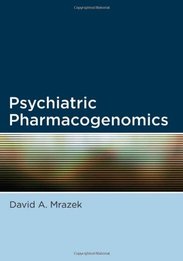 Publisher Summary: A book written to help clinicians to use pharmacogenomic testing to improve the pharmacotherapy that they provide for their patients. It is designed to teach clinicians how to order pharmacogenomic tests and interpret the results. Clinical examples are used to underscore the specific indications for pharmacogenomic testing and to clarify the clinical usefulness of identifying atypical genotypes that result in problematic responses to medication.The first section of the book begins with a basic review of molecular genetics. Additionally, the book also includes an extensive glossary of technical terms associated with molecular genetics and pharmacogenomics. The clinical utility of pharmacogenomic testing is demonstrated throughout the book by describing the implications of genetic variations for the care of individual patients. The second section of the book is organized into fourteen chapters that each focus on the clinical implications of testing for specific genes for which variants have been associated with either therapeutic response or side effects of psychotropic medications. Each of these chapters is structured in the same manner and involves a description of the gene and its significant variants. Each chapter also includes one or more clinical vignettes. The third section of the book discusses the clinical usefulness of pharmacogenomic testing, ethical issues associated with pharmacogenomic testing, and provides predictions for the future development of more sophisticated pharmacogenomic testing.
Publisher Summary: A book written to help clinicians to use pharmacogenomic testing to improve the pharmacotherapy that they provide for their patients. It is designed to teach clinicians how to order pharmacogenomic tests and interpret the results. Clinical examples are used to underscore the specific indications for pharmacogenomic testing and to clarify the clinical usefulness of identifying atypical genotypes that result in problematic responses to medication.The first section of the book begins with a basic review of molecular genetics. Additionally, the book also includes an extensive glossary of technical terms associated with molecular genetics and pharmacogenomics. The clinical utility of pharmacogenomic testing is demonstrated throughout the book by describing the implications of genetic variations for the care of individual patients. The second section of the book is organized into fourteen chapters that each focus on the clinical implications of testing for specific genes for which variants have been associated with either therapeutic response or side effects of psychotropic medications. Each of these chapters is structured in the same manner and involves a description of the gene and its significant variants. Each chapter also includes one or more clinical vignettes. The third section of the book discusses the clinical usefulness of pharmacogenomic testing, ethical issues associated with pharmacogenomic testing, and provides predictions for the future development of more sophisticated pharmacogenomic testing.
On Depression: Drugs, Diagnosis, and Despair in the Modern World
by Nassir Ghaemi
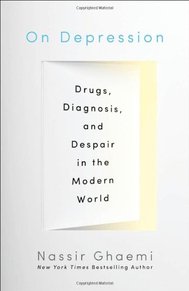 Publisher Summary: In a culture obsessed with youth, financial success, and achieving happiness, is it possible to live an authentic, meaningful life? Nassir Ghaemi, director of the Mood Disorder Program at Tufts Medical Center, reflects on our society’s current quest for happiness and rejection of any emotion resembling sadness. On Depression asks readers to consider the benefits of despair and the foibles of an unexamined life.Too often depression as disease is mistreated or not treated at all. Ghaemi warns against the “pretenders” who confuse our understanding of depression—both those who deny disease and those who use psychiatric diagnosis “pragmatically” or unscientifically. But experiencing sadness, even depression, can also have benefits. Ghaemi asserts that we can create a “narrative of ourselves such that we know and accept who we are,” leading to a deeper, lasting level of contentment and a more satisfying personal and public life. Depression is complex, and we need guides to help us understand it, guides who comprehend it existentially as part of normal human experience and clinically as sometimes needing the right kind of treatment, including medications. Ghaemi discusses these guides in detail, thinkers like Viktor Frankl, Rollo May, Karl Jaspers, and Leston Havens, among others. On Depression combines examples from philosophy and the history of medicine with psychiatric principles informed by the author’s clinical experience with people who struggle with mental illness. He has seen great achievements arise from great suffering and feels that understanding depression can provide important insights into happiness.
Publisher Summary: In a culture obsessed with youth, financial success, and achieving happiness, is it possible to live an authentic, meaningful life? Nassir Ghaemi, director of the Mood Disorder Program at Tufts Medical Center, reflects on our society’s current quest for happiness and rejection of any emotion resembling sadness. On Depression asks readers to consider the benefits of despair and the foibles of an unexamined life.Too often depression as disease is mistreated or not treated at all. Ghaemi warns against the “pretenders” who confuse our understanding of depression—both those who deny disease and those who use psychiatric diagnosis “pragmatically” or unscientifically. But experiencing sadness, even depression, can also have benefits. Ghaemi asserts that we can create a “narrative of ourselves such that we know and accept who we are,” leading to a deeper, lasting level of contentment and a more satisfying personal and public life. Depression is complex, and we need guides to help us understand it, guides who comprehend it existentially as part of normal human experience and clinically as sometimes needing the right kind of treatment, including medications. Ghaemi discusses these guides in detail, thinkers like Viktor Frankl, Rollo May, Karl Jaspers, and Leston Havens, among others. On Depression combines examples from philosophy and the history of medicine with psychiatric principles informed by the author’s clinical experience with people who struggle with mental illness. He has seen great achievements arise from great suffering and feels that understanding depression can provide important insights into happiness.
Integrative Neuroscience and Personalized Medicine
by Evian Gorgon and Stephen Koslow
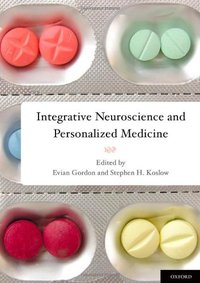 Publisher Summary: This book takes an in depth and hard look at the current status and future direction of treatment predictive markers in Personalized Medicine for the brain from the perspectives of the researchers on the cutting edge and those involved in healthcare implementation. The contents provide a comprehensive text suitable as both a pithy introduction to and a clear summary of the “science to solutions” continuum in this developing field of Personalized Medicine and Integrative Neuroscience. The science includes both measures of genes using whole genome approaches and SNIPS as well as BRAINmarkers of direct brain function such as brain imaging, biophysical changes and objective cognitive and behavioral measurements. Personalized Medicine for Brain Disorders will soon be a reality using the comprehensive quantitative and standardized approaches to genomics, BRAINmarkers and cognitive function. Each chapter provides a review of recent relevant literature; show the solutions achieved through integrative neuroscience and applications in patient care thus providing a practical guide to the reader. The timeliness of this book’s content is propitious providing bottom line information to educate practicing clinicians, health care workers and researchers, and also a pathway for undergraduate and graduates interested in further their understanding of and involvement in tailored personal solutions.
Publisher Summary: This book takes an in depth and hard look at the current status and future direction of treatment predictive markers in Personalized Medicine for the brain from the perspectives of the researchers on the cutting edge and those involved in healthcare implementation. The contents provide a comprehensive text suitable as both a pithy introduction to and a clear summary of the “science to solutions” continuum in this developing field of Personalized Medicine and Integrative Neuroscience. The science includes both measures of genes using whole genome approaches and SNIPS as well as BRAINmarkers of direct brain function such as brain imaging, biophysical changes and objective cognitive and behavioral measurements. Personalized Medicine for Brain Disorders will soon be a reality using the comprehensive quantitative and standardized approaches to genomics, BRAINmarkers and cognitive function. Each chapter provides a review of recent relevant literature; show the solutions achieved through integrative neuroscience and applications in patient care thus providing a practical guide to the reader. The timeliness of this book’s content is propitious providing bottom line information to educate practicing clinicians, health care workers and researchers, and also a pathway for undergraduate and graduates interested in further their understanding of and involvement in tailored personal solutions.
Philosophy of Psychopharmacology
by Dan Stein
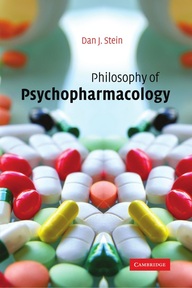 Publisher Summary: Psychotropic agents have been effective for the treatment of the emotional, and cognitive symptoms of serious psychiatric disorders. At the same time, the availability of such agents raises questions about the appropriate use of what might be termed ‘smart pills’, ‘happy pills’, or ‘pep pills’. This volume argues that developments in modern psychopharmacology raise a range of important philosophical questions, and may ultimately change the way we think about ourselves. It provides a framework for addressing important philosophical issues in psychiatry and psychopharmacology. The approach is a naturalistic one, drawing on theory and data from modern cognitive-affective neuroscience and attempts to address objective and subjective aspects of psychiatric disorders, to integrate our knowledge of mechanisms and meanings, and to provide a balanced view of the good and the bad of psychotropics.
Publisher Summary: Psychotropic agents have been effective for the treatment of the emotional, and cognitive symptoms of serious psychiatric disorders. At the same time, the availability of such agents raises questions about the appropriate use of what might be termed ‘smart pills’, ‘happy pills’, or ‘pep pills’. This volume argues that developments in modern psychopharmacology raise a range of important philosophical questions, and may ultimately change the way we think about ourselves. It provides a framework for addressing important philosophical issues in psychiatry and psychopharmacology. The approach is a naturalistic one, drawing on theory and data from modern cognitive-affective neuroscience and attempts to address objective and subjective aspects of psychiatric disorders, to integrate our knowledge of mechanisms and meanings, and to provide a balanced view of the good and the bad of psychotropics.
Brave New Brain: Conquering Mental Illness in the Era of the Genome
by Nancy Andreasen
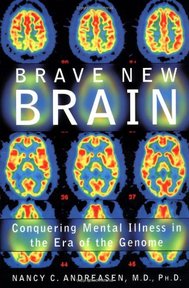 Publisher Summary: Here, leading neuroscientist Nancy Andreasen offers a state-of-the-art look at what we know about the human brain and the human genome–and shows how these two vast branches of knowledge are coming together in a boldly ambitious effort to conquer mental illness. Andreasen gives us an engaging and readable description of how it all works—from billions of neurons, to the tiny thalamus, to the moral monitor in our prefrontal cortex. She shows the progress made in mapping the human genome, whose 30,000 to 40,000 genes are almost all active in the brain. We read gripping stories of the people who develop mental illness, the friends and relatives who share their suffering, the physicians who treat them, and the scientists who study them so that better treatments can be found. Four major disorders are covered–schizophrenia, manic depression, anxiety disorders, and dementia–revealing what causes them and how they affect the mind and brain. Finally, the book shows how the powerful tools of genetics and neuroscience will be combined during the next decades to build healthier brains and minds. By revealing how combining genome mapping with brain mapping can unlock the mysteries of mental illness, Andreasen offers a remarkably fresh perspective on these devastating diseases.
Publisher Summary: Here, leading neuroscientist Nancy Andreasen offers a state-of-the-art look at what we know about the human brain and the human genome–and shows how these two vast branches of knowledge are coming together in a boldly ambitious effort to conquer mental illness. Andreasen gives us an engaging and readable description of how it all works—from billions of neurons, to the tiny thalamus, to the moral monitor in our prefrontal cortex. She shows the progress made in mapping the human genome, whose 30,000 to 40,000 genes are almost all active in the brain. We read gripping stories of the people who develop mental illness, the friends and relatives who share their suffering, the physicians who treat them, and the scientists who study them so that better treatments can be found. Four major disorders are covered–schizophrenia, manic depression, anxiety disorders, and dementia–revealing what causes them and how they affect the mind and brain. Finally, the book shows how the powerful tools of genetics and neuroscience will be combined during the next decades to build healthier brains and minds. By revealing how combining genome mapping with brain mapping can unlock the mysteries of mental illness, Andreasen offers a remarkably fresh perspective on these devastating diseases.
Psychiatry and Philosophy of Science
by Rachel Cooper
 Publisher Summary: Through an examination of these topics Cooper shows that psychiatry is similar enough to other sciences that ideas from the philosophy of science can be helpful in solving conceptual problems within psychiatry. Simultaneously, psychiatry is different enough from other sciences that it can provide new and fruitful perspectives on problems in the philosophy of science. Aimed at both mental health professionals and philosophers, Psychiatry and the Philosophy of Science is is an important addition to a rapidly expanding field of study.
Publisher Summary: Through an examination of these topics Cooper shows that psychiatry is similar enough to other sciences that ideas from the philosophy of science can be helpful in solving conceptual problems within psychiatry. Simultaneously, psychiatry is different enough from other sciences that it can provide new and fruitful perspectives on problems in the philosophy of science. Aimed at both mental health professionals and philosophers, Psychiatry and the Philosophy of Science is is an important addition to a rapidly expanding field of study.
Synaptic Self: How Our Brains Become Who We Are
by Joseph LeDoux
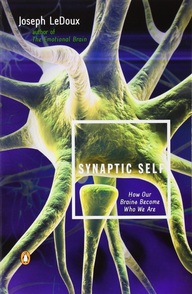 Publisher Summary: In 1996 Joseph LeDoux’s The Emotional Brain presented a revelatory examination of the biological bases of our emotions and memories. Now, the world-renowned expert on the brain has produced with a groundbreaking work that tells a more profound story: how the little spaces between the neurons—the brain’s synapses—are the channels through which we think, act, imagine, feel, and remember. Synapses encode the essence of personality, enabling each of us to function as a distinctive, integrated individual from moment to moment. Exploring the functioning of memory, the synaptic basis of mental illness and drug addiction, and the mechanism of self-awareness, Synaptic Self is a provocative and mind-expanding work that is destined to become a classic.
Publisher Summary: In 1996 Joseph LeDoux’s The Emotional Brain presented a revelatory examination of the biological bases of our emotions and memories. Now, the world-renowned expert on the brain has produced with a groundbreaking work that tells a more profound story: how the little spaces between the neurons—the brain’s synapses—are the channels through which we think, act, imagine, feel, and remember. Synapses encode the essence of personality, enabling each of us to function as a distinctive, integrated individual from moment to moment. Exploring the functioning of memory, the synaptic basis of mental illness and drug addiction, and the mechanism of self-awareness, Synaptic Self is a provocative and mind-expanding work that is destined to become a classic.
Anybody else have a Christmas list full of awesome nursing books? I am, of course, a little psychiatry obsessed. But what about you guys? Any cool new medical books out there?
Share on Facebook Share on Twitter Share on Pinterest
0 Comments on "All I Want for Christmas is Psychiatric Books"